Ongoing Research
GENDER DIFFERENCES ACROSS THE LIFESPAN IN NEUROPSYCHOLOGICAL TESTING PERFORMANCE IN ADHD POPULATION FROM THE YEARS 1991-2008
Fisher, Barbara C., Garges, Danielle M., Fulda, Stephany, Gambino, Maria, Maquire, Katie, Zipay, Danielle, Michael, Carissa, Zanetti, Cherise, Danner, Kimberley and Olthof, Emily, Gender differences across the lifespan in neuropsychological testing performance in ADHD population from the years 1991-2008, United Psychological Services, Max Planck Institute of Psychiatry, presented as an abstract at the American Neurology Association (ANA) annual conference in San Diego in September 2011.
Differences were found between males and females when comparing the test data of 673 adults and adolescents from the age of 15 to 73 years were included in the study. There were 419 males, 254 females, and all subjects were diagnosed ADHD (Inattentive Type). Excluded were those individuals who had any additional issues related to brain injury. The following neuropsychological tests were analyzed; Paced Addition Serial Attention Test (PASAT), Trail Making Tests, Stroop task, and the Symbol Digits Modalities task written (SDMT). Results revealed that females of all ages performed worse than males on all four trials of the PASAT. On the Stroop task, a significant interaction of depression and gender was found with females without depression performing better than males without depression while there were no gender differences for subjects with depression. Also depressed females performed worse than non-depressed females, while for males there was no difference. Males and females did not differ in performance on the SDMT and the two Trail Making Tests. Findings indicated that gender differences are present across the lifespan on tasks of information processing, as seen on performance on the PASAT. Additionally, depression serves as a moderating factor in performance on tasks assessing distractibility, as seen on the Stroop task to a greater degree for females than males. Significant gender differences do not occur systematically in performance on tasks such as the SDMT and Trail Making Tests, which involve speeded performance and whole brain functioning.
COGNITIVE AND BEHAVIORAL DIFFERENCES BETWEEN ADHD POPULATIONS (INATTENTIVE TYPE VERSUS ADHD PLUS) USING NEUROPSYCHOLOGICAL TESTING AND SELF-REPORTED SYMPTOMS IN DIAGNOSED POPULATION FROM YEARS 1991-2008
Fisher, Barbara C., Garges, Danielle M., Fulda, Stephany, Gambino, Maria, Maquire, Katie, Zipay, Danielle, Michael, Carissa, Zanetti, Cherise, Danner, Kimberley and Olthof, Emily, Cognitive and behavioral differences between ADHD populations (inattentive type versus ADHD plus) using neuropsychological testing and self-reported symptoms in diagnosed population from years 1991-2008, United Psychological Services, Max Planck Institute of Psychiatry, presented as an abstract at the American Neurological Association (ANA)annual conference in San Diego in September 2011.
The goal was to investigate the relationship between Inattentive Type ADHD and ADHD Plus using neuropsychological tests, self-reported anxiety and hyperactivity in a clinic population.
Testing was analyzed for 1,332 adults referred for ADD/ADHD testing (15-50 years, 831 males); 74% with diagnosed ADHD (Inattentive Type) and 24% with ADHD plus additional disorder (i.e. sleep apnea; brain dysfunction excluded). Neuropsychological tests included Trail Making Tests (A and B) and SDMT-W. Self-report measures assessed hyperactivity and anxiety on different self-report measures (PPCA, PHCA, PBC, PCC). The results suggest that Hyperactivity and anxiety were frequently seen with no significant difference between ADHD and ADHD plus. We found a significant relationship between hyperactivity and anxiety. Individuals who reported yes to one or both anxiety items had higher hyperactivity scores than those who said no to both items. Those adults identified with ADD plus performed worse on all neuropsychological tests. Findings indicate that ADHD (Inattentive Type) and ADHD plus can be differentiated on cognitive measures, but not on self-reported symptoms of anxiety and hyperactivity as these co-morbid factors are highly prevalent in both populations.
EFFECT OF REPORTED SLEEP AND ATTENTION SYMPTOMS ON NEUROPSYCHOLOGICAL TESTING PERFORMANCE IN ADULT DIAGNOSED ADD/ADHD POPULATION FROM THE YEARS 1991-2008
Fisher, Barbara C., Garges, Danielle M., Fulda, Stephany, Gambino, Maria, Maquire, Katie, Zipay, Danielle, Michael, Carissa, Zanetti, Cherise, Danner, Kimberley and Olthof, Emily, Neuropsychological testing performance in adult diagnosed ADD/ADHD population from the years 1991-2008, United Psychological Services, Max Planck Institute of Psychiatry, presented as an abstract at the Associated Professional Sleep Societies (APSS) annual conference in Baltimore in June 2011.
The purpose of this abstract was to investigate the influence of sleep and attention related symptoms on neuropsychological testing performance in a diagnosed ADD/ADHD population. There were a total of 1,262 adults age 15 to 80 years included in the sample analysis. There were 802 males and 451 females; 935 of which were diagnosed with ADD and 305 of which were diagnosed with ADD plus an additional disorder (affecting sleep and/or impact to brain function). A neuropsychological test battery was utilized to assess attention variables and self-report measures were employed to assess sleep and other health factors. The self-report measures included the Personal Problems Checklist for Adults, Personal History Checklist for Adults, Patient Behavior Checklist for ADHD Adults and Physical Complaints Checklist for ADHD Adults. Neuropsychological Test measures included Stroop Color-Word Test, Symbol Digits Modalities Test (Written) and the PASAT. Results revealed that those individuals diagnosed with only ADD (versus ADHD plus an additional disorder) performed better on most of the test measures. Females performed worse than males on all of the PASAT, paced addition trials. Sleep disturbances did not influence task performance but tiredness had a significant interaction on the test measures and the effect of tiredness was stronger for females.
SELF-REPORTED SLEEP PROBLEMS AND NEUROPSYCHOLOGICAL PERFORMANCE IN ADHD
Fisher, Barbara C., Garges, Danielle M., Fulda, Stephany, Gambino, Maria, Maquire, Katie, Zipay, Danielle, Michael, Carissa, Zanetti, Cherise, Danner, Kimberley and Olthof, Emily, United Psychological Services, Max Planck Institute of Psychiatry, presented as an abstract at the World Association of Sleep Medicine (WASM) conference in Quebec in September 2011.
The goal of this study was to explore the impact of self-reported sleep problems (disturbed sleep and hypersomnia/sleepiness) on neuropsychological performance in subjects with ADHD without a diagnosed sleep disorder. This was a retrospective chart review of 607 adults and adolescents (15-73 years, 229 females, 378 males) with diagnosed ADHD (Inattentive Type) and without diagnosed sleep disorder or brain injury/insult. Neuropsychological tests used the Trail Making Tests, the Stroop test and the SDMT-W. Self-reported problems initiating or maintaining sleep (sleep disturbance) and hypersomnia or sleepiness were extracted from the Personal History Checklist for Adults. Self-reported sleep problems were found to have no influence on performance in the Trails Making-B, Stroop test or SDMT-W. Subjects with self-reported problems initiating or maintaining sleep performed worse on the Trail Making-A. Self-reported sleep problems in ADHD had an impact only on a speeded sequencing measure. There was no impact seen on a measure of whole brain functioning that is also dependent upon speed. Similarly, there was not an influence seen on a task of divided attention measuring distractibility or a task of cognitive flexibility that assesses executive function when controlling for age, gender, depression, anxiety and pre-morbid intelligence. While we have found that more ADHD subjects report sleep problems, these problems were found to influence performance on only one of the test measures assessed which is a task highly dependent upon speed..
EFFICACY OF A BRAIN/COGNTIIVE TRAINING THERAPEUTIC PROGRAM FOR DIAGNOSED DEMENTIA
Fisher, Barbara C. Fisher and Garges, Danielle M., United Psychological Services, Presented as an abstract for the American Neurological Association (ANA) Annual Meeting in Boston, October 2012.
The goal was to examine the efficacy of an individually designed therapeutic program for the remediation of memory deficits resulting from diagnosed dementia (all brain injuries excluded) diagnosis determined through neuropsychological evaluation and by treating primary care physician, psychiatrist, neurologist or cardiologist. Neuropsychological dementia evaluation was completed prior to and following therapeutic intervention in a clinic population. Testing results were analyzed of adults who were referred for assessment of memory difficulties (age 64 to 80 years, n=14) who received cognitive training and had pre and post testing. The Repeatable Battery for the Assessment of Neuropsychological Status (RBANS) was utilized to measure memory and overall functioning pre and post treatment. On average, a total of 2 to 4 months elapsed between pre and post testing. Areas of immediate, delayed, and overall functioning evaluated improved following treatment when mean differences were assessed. Between 5 and 14 point differences were found for immediate, delayed, and overall functioning. Paired samples t-tests revealed significant differences between pre and post treatment scores for overall functioning (p=0.025) and delayed memory recall (p=0.057). Findings indicate that overall functioning and delayed memory recall evidenced improvement following as short a duration of time as 2 months of treatment. The therapeutic program utilized appears to be effective in augmenting memory and overall functioning in a clinical population of diagnosed dementia patients.
EFFICACY OF COGNITIVE TRAINING PROGRAM FOR ATTENTION/MEMORY/NEUROPSYCHOLOGICAL DEFICITS IN ADULTS WITH TRAUMATIC BRAIN INJURY
Fisher, Barbara C. Fisher and Garges, Danielle M., United Psychological Services, Abstract to be presented at the American Academy of Neurology (AAN) Annual Meeting in San Diego in March of 2013.
The purpose was to determine the effectiveness of a therapeutic program utilized to address memory and neuropsychological deficits determined through neuropsychological testing conducted prior to and following therapeutic intervention in an adult clinic population. The population consisted of adults referred for assessment of memory and neuropsychological deficits following traumatic brain injury (age 19 to 72 years, n=24) who received cognitive training treatment and had pre and post testing. The Repeatable Battery for the Assessment of Neuropsychological Status (RBANS), Doors and People Test, Brief Visuospatial Memory Test-Revised (BVSMT-R), and the California Verbal Learning Test (CVLT) were utilized to assess areas of functioning prior to and following participation in a therapeutic treatment program. Findings revealed statistically significant differences in scores for initial and re-evaluation testing following treatment. Paired samples t-tests revealed significant differences between initial and re-evaluation scores for the shapes test (p=.039), the names test (p=0.03), and overall recall (p= 0.30) on the Doors and People test. There was a significant difference between the initial and re-evaluation test scores for trial 2 (p=.030), trial 3 (p= .052), and delayed recall (p=.033) of the BVSMT-R. There was a significant difference between the initial and re-evaluation test scores for the CVLT for the T-score total for trials one to five (p= .008), short delay free recall (p= .006), long delay free recall (p=.001), and long delay cued recall (p=.005). There was a significant difference between the initial and re-evaluation test scores for attention on the RBANS (p= .013). Findings indicate that therapeutic intervention has been beneficial in recovering functioning in a clinic population of adults with traumatic brain injury. Improvements in the areas of attention, visual, verbal, and delayed memory were accomplished in as short a duration of time as 3 months of treatment.
Recent
Articles
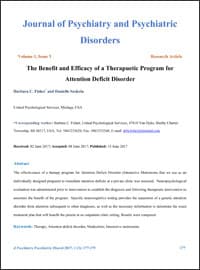
The Benefit and Efficacy of a Therapuetic Program for Attention Deficit Disorder
Barbara C. Fisher* and Danielle Szokola

The Benefit and Efficacy of a Therapuetic Program for Attention Deficit Disorder
Barbara C. Fisher* and Danielle Szokola
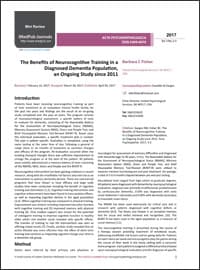
The Benefits of Neurocognitive Training in a Diagnosed Dementia Population, an Ongoing Study since 2011
Barbara C. Fisher

The Benefits of Neurocognitive Training in a Diagnosed Dementia Population, an Ongoing Study since 2011
Barbara C. Fisher
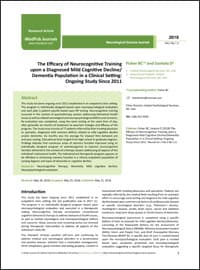
The Efficacy of Neurocognitive Training upon a Diagnosed Mild Cognitive Decline/ Dementia Population in a Clinical Setting: Ongoing Study Since 2011
Fisher BC and Szokola D

The Efficacy of Neurocognitive Training upon a Diagnosed Mild Cognitive Decline/ Dementia Population in a Clinical Setting: Ongoing Study Since 2011
Fisher BC and Szokola D
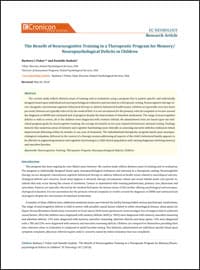
The Benefit of Neurocognitive Training in a Therapeutic Program for Memory / Neuropsychological Deficits in Children
Barbara C. Fisher and Danielle Szokola

The Benefit of Neurocognitive Training in a Therapeutic Program for Memory / Neuropsychological Deficits in Children
Barbara C. Fisher and Danielle Szokola
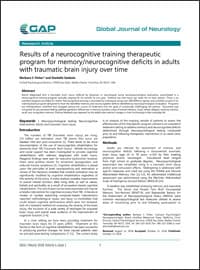
Results of a neurocognitive training therapeutic program for memory / neurocognitive deficits in adults with traumatic brain injury over time
Barbara C. Fisher and Danielle Szokola

Results of a neurocognitive training therapeutic program for memory / neurocognitive deficits in adults with traumatic brain injury over time
Barbara C. Fisher and Danielle Szokola
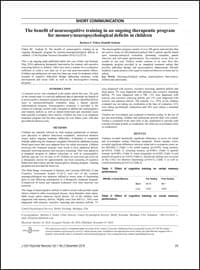
The benefit of neurocognitive training in an ongoing therapeutic program for memory / neuropsychological deficits in children
Barbara C. Fisher and Danielle Szokola

The benefit of neurocognitive training in an ongoing therapeutic program for memory / neuropsychological deficits in children
Barbara C. Fisher and Danielle Szokola
